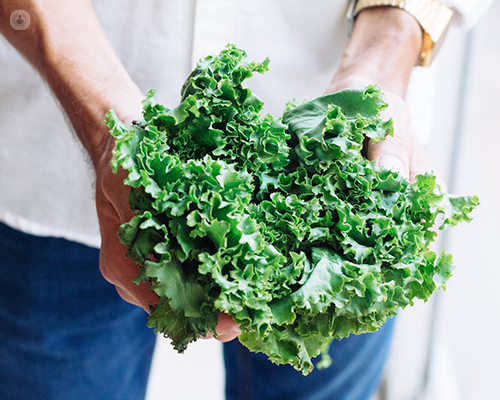FODMAP diet: how it helps IBS
Escrito por:The low FODMAP diet is a scientifically proven dietary treatment for the management of irritable bowel syndrome (IBS). Given how common IBS is – and the impact that it can have on the quality of life - it's no surprise that the low FODMAP diet has become hugely popular.
We’ve asked expert gastroenterologist Dr Aathavan Loganayagam to explain how the temporary eating plan can help drastically improve digestive symptoms.

What does FODMAP stand for and what are they?
"FODMAP" is an acronym for fermentable oligosaccharides, disaccharides, monosaccharides and polyols.
These are a collection of short-chain carbohydrates found in foods naturally or as food additives, and they include sugars such as fructose (when in excess of glucose), lactose, fructans, galactooligosaccharides (GOS), and sugar alcohols (such as sorbitol and mannitol).
FODMAPs can pass through the digestive tract into the large intestine, where they are readily fermented by bacteria. This produces gas, which can contribute to bloating and abdominal pain. The presence of these substances in the large bowel can also draw fluid in, which can lead to changes in bowel motions.
Where can I find low FODMAP foods?
Food companies are now making low FODMAP products. You can find low FODMAP cookbooks in book shops, and blogs, websites, and apps provide an enormous amount of information to help people follow the diet.
While this can be extremely valuable for those on the diet, it also means that people can now potentially try this on their own without the support of a nutrition professional, and in some cases, this can have unintended consequences.
Because some FODMAPs have prebiotic effects, namely GOS and fructans, a low FODMAP diet restricts the intake of prebiotic fibres.
Prebiotics are the food for our gut bacteria. A prebiotic-rich diet is considered beneficial, and there are concerns that the restriction and/or elimination of these may be detrimental to long-term gut health.
Can I start the FODMAP plan without seeing a doctor?
Before going down the low FODMAP path, it's important to see a gastroenterologist to rule out any other conditions affecting the gut.
The low FODMAP diet can be quite restrictive and many nutritious foods are high in FODMAPs, so if it is followed long-term without professional guidance, you may also be at risk of nutritional deficiencies.
The low FODMAP diet is not a no FODMAP diet. Nor is it a forever diet – it is a tool intended to identify the foods triggering your symptoms. As the diet isn't curative (it is for symptom management only) and work must continue to be done on the gut and digestion to help improve its function.
How does it work? What are the stages?
The FODMAP dietary management of IBS consists of stages, with the first stage being the low FODMAP diet. This stage, in which you eliminate high FODMAP foods, is only intended to last for up to six weeks.
From here, you begin the challenge/reintroduction phase, where you systematically reintroduce one FODMAP at a time to assess your tolerance.
Not everyone reacts to the same FODMAPs (for example, you may only react to one or two of the FODMAPs) or to the same extent, so you don't necessarily need to eat in a way that is completely low FODMAP to manage your symptoms.
How does the FODMAP diet help overall?
At the end of this process, you should understand which FODMAPs you react to and the doses of these that you can tolerate. You can then personalise the diet to manage your symptoms, without unnecessarily restricting the foods you can eat.
Symptoms are only experienced once your overall load for a particular FODMAP exceeds your personal tolerance threshold, so you only need to restrict FODMAPs to the extent required to remain below this. For example, in, some people only need to avoid onion, garlic and apples for adequate symptom relief.
If you are interested in trying the low FODMAP diet, seek guidance from a qualified nutrition professional with experience in this approach, or do not hesitate to book a first consultation with Dr Loganayagam regarding any gastrointestinal concerns.


